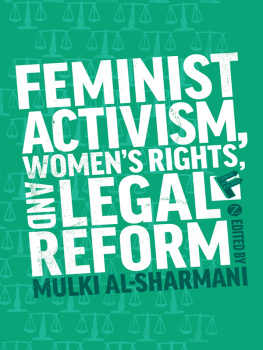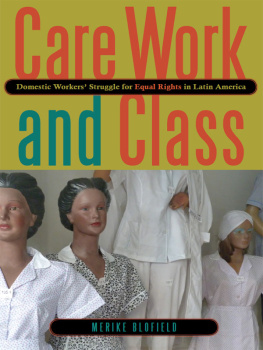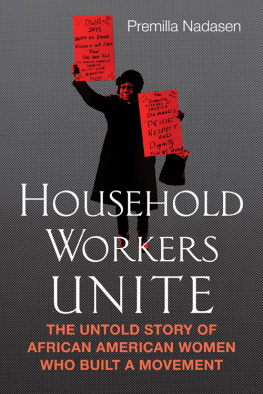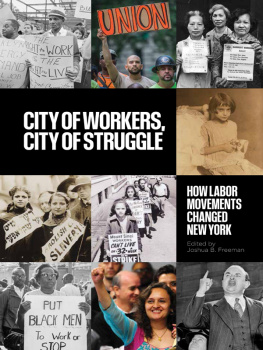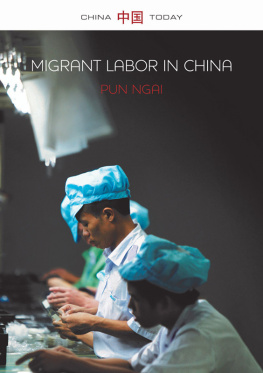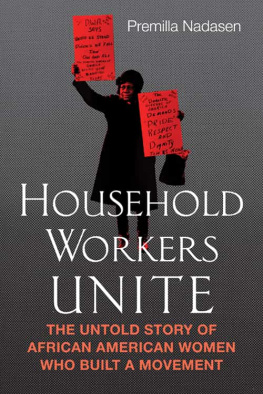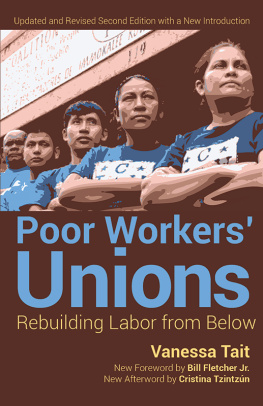THIS BOOK WAS PUBLISHED
with the assistance of the
ANNIVERSARY ENDOWMENT FUND OF
the University of North Carolina Press.
2011 The University of North Carolina Press
All rights reserved. Manufactured in the United States of America.
Designed by Courtney Leigh Baker and set in Whitman with Milk Script and Bureau Eagle display by Rebecca Evans. The paper in this book meets the guidelines for permanence and durability of the Committee on Production Guidelines for Book Longevity of the Council on Library Resources. The University of North Carolina Press has been a member of the Green Press Initiative since 2003.
Library of Congress Cataloging-in-Publication Data
May, Vanessa H.
Unprotected labor : household workers, politics, and middle-class reform in New York, 18701940 / Vanessa H. May.
p. cm.
Includes bibliographical references and index.
ISBN 978-0-8078-3477-0 (cloth : alk. paper)ISBN 978-0-8078-7193-5
(pbk. : alk. paper)
1. Women household employeesNew York (State)History. 2. Women household employeesLabor unionsNew York (State)History. 3. WomenNew York (State) Social conditionsHistory. 4. Labor movementNew York (State)History. I. Title.
HD6072.2.U52.N676 2011
331.481640974709031dc22
2010047551
cloth 15 14 13 12 11 5 4 3 2 1
paper 15 14 13 12 11 5 4 3 2 1
Contents
THE TYRANT OF THE HOUSEHOLD
The Debate over the Servant Question and the Privacy of the Middle-Class Home, 18701915
STICKING TOGETHER THROUGH GOOD TIMES AND BAD
Immigrant Domestic Workers, Ethnic Communities, and Resistance
ENCOURAGING THE GOOD, WEEDING OUT THE BAD, AND TEACHING THE IGNORANT
Women's Organizations and Domestic Workers in New York City, 18701915
THE ENLIGHTENED MAJORITY VERSUS THE DIEHARD FRINGE
The State and Reform of Domestic Service, 19151940
EVERY DOMESTIC WORKER A UNION WORKER
Middle-Class African American Organizations and Domestic Workers Confront Labor Exploitation during the Depression
EPILOGUE
The Walls of Jericho
Illustrations
Frederick Opper, Our Selfmade Cooks From Paupers to Potentates
A middle-class couple exits one of this New York City tenement district's domestic employment agencies
A drawing included in the Wilson Industrial School for Girls 1884 annual report
Students at the Wilson Industrial School for Girls, ca. 1900
Sociologist and reformer Frances Kellor, ca. 19001915
Women taking part in a National Council on Household Employment training program
A young woman scrubs an icebox as part of a WPA domestic training program in New York
Dora Jones, the leader of the Domestic Workers Union in New York City, ca. 1940
Acknowledgments
I have always loved reading other authors acknowledgmentstracing academic genealogies and taking note of ways of thanking people that I particularly liked. I looked forward to writing my own. Now I have discovered there are no words to thank adequately the people who have so generously and selflessly offered me their time, effort, and wisdom. I will try to do them justice.
Historians need capable, friendly, and knowledgeable archivists, and I have had the good fortune to meet many. The staffs at Columbia's Rare Book and Manuscript Library, the Newark Public Library, the Manuscripts and Archives Division of the New York Public Library, the Schomburg Center for Research in Black Culture, the New York Municipal Archives, the Tamiment Library and Robert F. Wagner Labor Archives, Ellis Island, and the Schlesinger Library were uniformly helpful and full of suggestions for further research. The Wertheim Study at the New York Public Library gave me a quiet space to write the book. Jonathan Frye at the Lindquist Group opened his company's records to me and showed real enthusiasm about the project. Special thanks to Ellen Belcher at John Jay College, Maida Goodwin at the Sophia Smith Collection at Smith College, Steven Siegel at the 92nd Street Y, and Curtis Lyons and Patrizia Sione at the Kheel Center at Cornell University. Their friendliness and generosity made research a pleasure.
This book began at the University of Virginia, where I was lucky to be part of a vibrant scholarly community. The Corcoran Department of History and the College of Arts and Sciences funded the project with travel grants, teaching assignments, and a fellowship. Grace Hale and Brian Balogh read my work and advised me with good cheer, and I am glad to have had the benefit of their insights. I am especially lucky to have worked with Cindy Aron. Her readings of my work were both numerous and meticulous. She could always, as if by magic, put her finger on exactly what would make my argument stronger and my prose better. She continues to be an unfailing source of support, practical advice, and warm encouragement. She is the model of a teacher, scholar, advocate, friend, and mentor that I will look to for the rest of my career.
I also benefited from the companionship of brilliant graduate students. Particular thanks to the Junto, Andrew Torget and Erik Alexander, who read and critiqued my very first and feeble efforts at writing in graduate school and have remained (I hope) lifelong friends. Their wives, Alexandra Torget and Carrie Alexander, are long-suffering listeners to discussions of historiography and research.
I am particularly grateful to Kristin Celello and Melissa Estes Blair, both of whom have read and reread much of this manuscript. They have also happily delivered a wide array of pep talks when the going got rough. Kristin and Carl Bon Tempo are always ready with good advice, no matter how frantic or long-winded my questions. Both are brilliant scholars and truly amazing cooks. I am a lucky beneficiary of both talents.
Scholars outside of the University of Virginia have also been extremely generous. Eileen Boris is a fierce advocate of my work and has read the full manuscript at least three times. Her revision suggestions were always excellent, and I am in awe of her grasp of the literature on this (and, really, every) subject. Despite the fact that she has no official responsibility for my career, she has always readily offered advice and support. I am grateful to count her as a friend and mentor.
Rebecca Edwards read the entire manuscript and bears responsibility for sending me to graduate school in the first place. Miriam Cohen also read a chapter and has been very encouraging. Leigh Ann Wheeler and Dorothea Browder also offered excellent suggestions for revision of part of the manuscript. This book is better for their ideas. Sian Hunter, Beth Lassiter, Kate Torrey, Paula Wald, and countless others at the University of North Carolina Press have been incredibly patient with me, and I am grateful for their help and support in moving this manuscript to publication. Rebecca Sharpless read the manuscript carefully and helped to improve its argument and prose. Madeleine Glennon came through in the clutch and tracked down a lastminute citation. Members of the Brooklyn writing group have offered careful readings, excellent company, and delicious wine and cheese. They are Charlotte Brooks, Richard Greenwald, Anne Kornhouser, Jonathan Soffer, Jeffrey Trask, Lara Vapnek, and Tim White. I am also happy to thank my colleagues at Seton Hall University who have welcomed me into their department, namely Tracey Billado, William Connell, Larry Greene, Williamjames Hoffer, Nathaniel Knight, Dan Leab, Maxine Lurie, Maxim Matusevich, James McCartin, Murat Menguc, Mark Molesky, Dermot Quinn, Thomas Rzeznik, and Kirsten Schultz.


